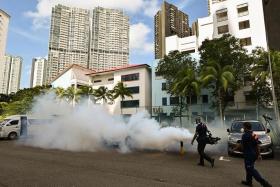Swell in demand for mosquito-repelling plants
Nurseries say more people want mosquito-repelling plants
Plant nurseries are reporting an increase in demand for plants that are touted to have mosquito repellent properties.
Several nurseries The New Paper approached said that more people are asking about and looking for the citronella grass since news of the Zika virus being locally transmitted here broke late last month.
Sales and marketing director of Far East Flora Peter Cheok declined to reveal sales figures, but said the company had to "more than double the usual order" for mosquito-repelling plants.
It had a "few pots left" when TNP called earlier in the week. By Wednesday, it was stocking new plants.
Meanwhile, commercial repellent products are increasing using plant-based ingredientsas they are commonly perceived as "safe" and therefore popular among consumers.
Other mosquito-repelling plants include rosemary, lavender, lemongrass, peppermint and lemon balm.
Ms Joeann Chua, director of Hua Hng Trading, a wholesaler for plants and landscaping materials, said sales for Pelargonium graveolens, commonly referred to as the "mosquito plant", were "higher than normal".
She said: "The plant gives off a citronella scent and is effective in keeping mosquitoes away from a small room or space.
"We are currently totally sold out and our current incoming stocks for this week are only enough to cover some advanced orders."
ADDITIONAL ORDER
As the demand for anti-mosquito products surged, NTUC FairPrice placed an additional order for 175,000 of different types of insect repellents and insecticides.
They will arrive in batches this week and will be dispatched to its stores islandwide.
More than 115,000 anti-mosquito products were bought at its outlets from last Thursday to Sunday.
Chief executive officer of NTUC FairPrice Seah Kian Peng said: "We want to assure the community that additional stocks of anti-mosquito products are being sent to our stores and we will keep prices stable. There is no need to stock up as we will continue to bring in more supplies."
Haw Par Corporation, which owns the Tiger Balm brand, told TNP the sales of its Tiger Balm Mosquito Repellent range has risen dramatically.
"We have been gearing up for the fight against dengue for some time, but the Zika epidemic caught us by surprise," its spokesman said.
"We are ramping up and have asked our factories to step up production urgently to meet the sudden surge in demand."
Types of mosquito-repelling plants
Apart from the citronella grass, there are other plants used to repel mosquitoes:

Peppermint: Most bugs do not like the smell and taste of peppermint. Plus, if you happen to get bitten, rubbing peppermint leaves directly onto the skin provides relief.

Lavender: Apart from repelling mosquitoes, the scent of lavender also repels moths, fleas and flies.

Rosemary: When burned, rosemary may smell good to humans, but it is unpleasant enough to keep mosquitoes away.

Pelargonium: Also called the "mosquito plant", it is a cross between the Chinese Citronella and the African Geranium. The leaves, which resemble those of a fern, contain citronella oil, which repels mosquitoes.

Marigolds: The plant contains pyrethrum, an ingredient found in many insect repellents. It has an aroma that bugs find repulsive.

Lemon balm: For a quick mosquito repellent, crush a handful of lemon balm leaves in your hand and rub them on your exposed skin.

Lemongrass: Its strong fragrance makes lemongrass a natural insect repellent. To help deter mosquitoes, it is usually planted along walkways and close to seating areas.
Source: Far East Flora and naturallivingideas.com
Number of new Zika cases falls
The number of new Zika cases fell to eight yesterday, according to figures from the Ministry of Health (MOH), but a new cluster could be forming.
As of noon, MOH confirmed eight new locally transmitted cases. Two were linked to the Aljunied Crescent/Sims Drive/Kallang Way/ Paya Lebar Way cluster. Another was linked to the Bishan Street 12 cluster.
There is a potential new cluster involving one previously reported case and a new case yesterday, MOH said.
Both patients live in the Elite Terrace area in Siglap. The other four cases have no known links to any existing cluster.
The total number of Zika cases transmitted locally is now 283.
Vector control operations to eradicate the Aedes mosquito, which spreads Zika and dengue, continued in affected areas.
As of Tuesday, 150 breeding habitats have been destroyed in the cluster areas, the National Environment Agency (NEA) said.
Members of the public can get updated information on Zika at NEA's websites: www.nea.gov.sg/zika and www.nea.gov.sg/zika-clusters. - The Straits Times Online.
Get The New Paper on your phone with the free TNP app. Download from the Apple App Store or Google Play Store now


